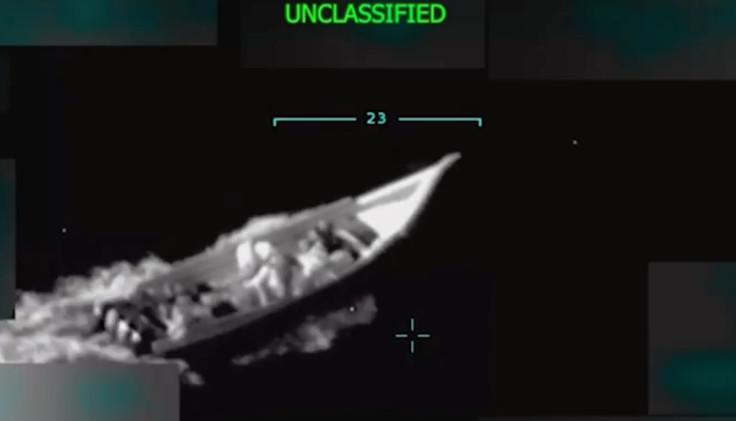
The U.S. military carried out a strike on an alleged drug vessel travelling from Venezuela to the United States on Tuesday, killing eleven people, according to President Donald Trump.
The attack followed weeks of speculation over U.S. military intervention in the region after the Pentagon deployed warships, a nuclear-powered submarine, and 4,500 troops to the Southern Caribbean.
While Trump hailed the strike as a victory against drug trafficking, analysts say the move is unlikely to hinder the narcotics trade and represents a significant violation of international law.
A strike against 'narcoterrorists'
"Earlier this morning, on my Orders, U.S. Military Forces conducted a kinetic strike against positively identified Tren de Aragua Narcoterrorists," President Donald Trump wrote in a Truth Social post alongside a video depicting a speedboat exploding in the sea.
Tren de Aragua (TDA) is a gang from Venezuela that the White House designated as a terrorist organization in February alongside other groups, laying the groundwork to deploy the military against them. The Trump administration also deported hundreds of Venezuelan migrants accused of being members of the gang, some of whom were later found to be innocent.
Tuesday's attack took place roughly three weeks after Trump ordered the Pentagon to prepare military options against drug cartels in Latin America.
While U.S military presence is not uncommon in the Southern Caribbean, the scale of the build-up is notable and comes amid Trump's pledge to crack down on drug trafficking in the region.
"Please let this serve as notice to anybody even thinking about bringing drugs into the United States of America. BEWARE!," wrote Trump in his Truth Social post.
However, analysts say attacks like these are unlikely to stop traffickers or have a lasting impact on the drug trade.
"Trump seems to believe that unlawful attacks like this can somehow deter and reduce drug trafficking. But that won't be the case," said John Walsh, Director for Drug Policy and the Andes at the Washington Office on Latin America (WOLA).
Walsh went on to explain that traffickers are unlikely to be dissuaded due to the size and profitability of the drug market, and have "shown time and again that they can adapt to enforcement pressures."
Pressure on Venezuela's Maduro
While the attack is unlikely to deter drug traffickers, some experts say it was also aimed at sending a message to the Maduro regime: that the Trump administration is willing to use force to achieve its goals in the region.
"It could be considered a more concrete and direct message not to TDA, but to Maduro and his leadership... that the U.S. is ready to act," said Ronna Rísquez, a Venezuelan journalist and author of a book on Tren de Aragua.
Indeed, the strike follows mounting U.S. pressure on Maduro, with the White House recently doubling the bounty on his head to USD$50 million and accusing him of being "one of the largest narco-traffickers in the world."
Rísquez believes Tuesday's strike was intended as a message to Maduro that, "just as they attacked a Venezuelan vessel, they can also attack other Venezuelan targets in Venezuela."
The Venezuelan president did not directly respond to the strike in a television appearance on Wednesday, instead playing a famous song called "Jaws" about U.S. imperialism in Latin America.
Maduro's nationalist appeals have been ramping up in recent weeks amid Washington's naval deployment.
"The government has responded as one might expect, with anti-imperialist rhetoric, mobilisation (or at least announcements about mobilisation) of military forces and the Bolivarian Militia," said Phil Gunson, Senior Andes Analyst at International Crisis Group.
Following Washington's deployment of forces to the region, Maduro ordered the mobilization of what he said were some 4.5 million militia members. He also warned Trump on Monday that a war in Venezuela would "stain (Trump's) hands with blood" and said Venezuela would declare an "armed struggle and a Republic in arms" if attacked.
But Venezuelans appear to be divided, with Gunson, who is based in Caracas, saying: "the population has mostly gone about its business as usual, with some genuinely excited about potential regime-change, others fearful and some making fun of the whole exercise."
The analyst said Tuesday's attack is unlikely to affect Maduro's reputation at home, where he remains "very unpopular."
Violation of international law
Even if the strike may not deal a blow to Maduro or the international drug trade, experts say it represents an alarming use of force by the Trump administration.
"[Tuesday's] lethal attack marks an escalation in U.S. tactics, constituting a blatant violation of international laws governing the use of force in international waters, taking the lives of 11 people," said WOLA's Walsh.
Under international law, states should not use lethal force against vessels unless under direct threat.
While the United States is not a signatory to the United Nations Convention on the Law of the Sea which governs international waters, it has previously committed to following its guidelines.
Venezuela's neighbors had mixed reactions to the strike, with Trinidad and Tobago's prime minister calling for further attacks on narcotics boats while Colombian president Gustavo Petro condemned it.
It is unclear whether the strike is a one-off, but the White House said last Thursday that the president is willing to use "every element of American power to stop drugs from flooding into our country."
"No one knows what might come next," Crisis Group's Gunson concluded.
© 2025 Latin Times. All rights reserved. Do not reproduce without permission.




